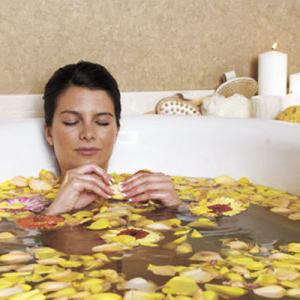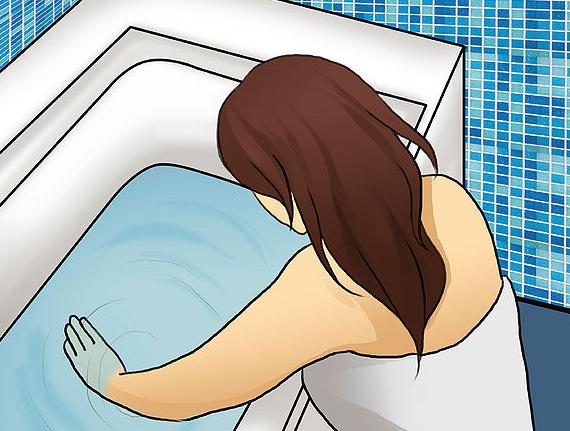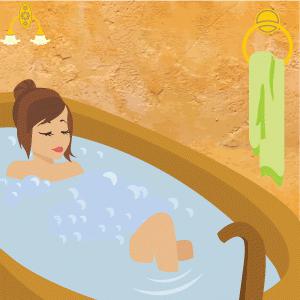Antipyretics for children are prescribed by a pediatrician. But there are emergency situations with fever when the child needs to be given medicine immediately. Then the parents take responsibility and use antipyretic drugs. What is allowed to be given to infants? How can you lower the temperature in older children? What medications are the safest?
During the period of bearing a baby, every woman should be very attentive to everything that happens to her. After all, the most harmless things at first glance can threaten not only the health, but also the life of her baby. In this article we will talk about whether pregnant women can take a bath.
About cleanliness
First of all, it must be said that while carrying a child, a woman should take special care of herself. Compliance with personal hygiene rules is what is important. Indeed, during pregnancy the following nuances are possible:
- Some women experience increased sweating (especially in the last months of pregnancy).
- The amount of vaginal discharge increases significantly.
- The number of urination processes increases.
All these actions can cause discomfort and even cause an unpleasant odor. Therefore, women should wash as often as possible (especially wash themselves). In addition, this will be an excellent measure to prevent the development of various fungal diseases. However, what is better to give preference to: a shower or a filled bath?

Main cons
As soon as a woman finds out that she is “in a position,” a wall of human speculation and prejudice begins to grow around her. It is even interesting that some “old school” experts will also agree with the following statements. So, why shouldn't pregnant women take a bath (according to homegrown experts)? There are several reasons:
- Risk of infection. Pathogenic bacteria and microorganisms can enter the expectant mother’s body from water, which can lead to the development of serious diseases.
- Taking a bath can cause miscarriage.
- There is also an opinion that a warm bath can cause premature birth.
A simple rebuttal
However, are these statements true? I would like to understand this in more detail. As for infection, the likelihood of catching some kind of disease from tap water is unlikely. It should be remembered that the uterus is surrounded by a mucus plug, and the baby is surrounded by amniotic fluid. All these elements are designed to protect the baby from the effects of various pathogenic bacteria. That is why this statement is not true. As for premature birth or miscarriage, in extreme cases, hot water can provoke them. However, taking a normal, warm bath will definitely not cause any harm to the expectant mother and her baby. Or rather, on the contrary, it will become an excellent means of relaxation.
About the benefits of a bath
Can pregnant women take a bath? The answer will be clearly affirmative. In addition, it is even beneficial for the body of the mother and her baby. What good can warm water do?
- Taking a warm bath is a great way to relieve swelling (a problem that pregnant women face, especially in the last months). It is important that it improves blood flow to the legs.
- Warm water perfectly improves blood circulation. And this is useful not only for the mother, but also for her baby, because it is through the bloodstream that the baby receives not only oxygen, but also all the nutrients for its own growth and development.
- Reducing lower back pain. A warm bath can also have a relaxing effect. And this is very important for women, especially in the last months of bearing a baby.
- Relieving tension.
Doctors' opinion
What will doctors answer if they are asked whether pregnant women can take a bath? They will definitely give an affirmative answer. Moreover, modern doctors even advise pregnant women to do water aerobics or just visit the pool. As for open reservoirs, doctors also say that you can swim there. However, if there is permission for this from the sanitary and epidemiological service (all equipped recreation areas near open water bodies must have this permission).

About supplements
When figuring out whether pregnant women can take a bath, it’s worth spending a few words on the various supplements that ladies love to use. As for bubble baths, you can use it without fear. However, you need to be especially careful when using aromatic oils. Before using them, it is best to consult your doctor. After all, some aromatic oils may contain allergens that will harm the child. Among the dangerous extracts are the following:
- Cedar.
- Basilica.
- Thyme.
- Patchouli.
- Rosemary.
- Cypress.
The perfect bath
So, we found out that pregnant women can take a bath. And even necessary! However, it is worth giving a couple of tips on how to do it correctly. What is the ideal bathroom for an expectant mother?

- The temperature of the water in the bath should not be higher than 37 degrees, i.e. body temperature. This is the best option and will not cause any harm at all.
- Don't be afraid of infection.
- You need to be especially careful when handling various aromatic additives. During the period of gestation, it is still better to completely exclude them.
- Instead of shower gel, it is best for the expectant mother to use baby soap. It has a pleasant smell and does not cause allergic reactions at all.
- After taking a bath, a woman should apply a moisturizer to her body. Particular attention should be paid to the tummy.
- It is best to place a rubber mat on the bottom of the bathtub for safety reasons. This will help the expectant mother better maintain her balance on a slippery surface. You also don’t have to refuse help when getting out of the bath.
- Can pregnant women take a bath? Certainly! However, it is best to do this for no longer than 15 minutes. This is the optimal time, which is enough for the body to fully rest.
- While lying in the bath, the expectant mother should remember that her shoulders should remain above the water. This will help avoid overheating of the body.
By following these tips, the expectant mother will be able to get only advantages from the bathing procedure and will not harm her health at all (as well as the well-being of her baby).
About the hot bath
What can you answer to ladies who ask the question of whether pregnant women can take a hot bath or not? Absolutely not! This can be very dangerous (unlike taking a warm bath). What problems might this cause?
- Placental abruption (resulting in miscarriage).
- Premature birth (even at the smallest stage).
- Bleeding.
It is worth saying that taking a too hot bath is one of the popular methods of getting rid of an unwanted pregnancy. However, most often it does not work, and the expectant mother’s body is endangered. This is why pregnant women should not take a hot bath. After all, this can cause the loss of a child at any stage of gestation.
When is it better to stop taking a bath?
Can pregnant women take a bath? Every woman should not hesitate to ask her doctor this question. After all, there are situations and problems in which this action is contraindicated. What could it be?
- Periodic bleeding. If the expectant mother suffers from this problem, she should completely refuse to take baths, even warm ones.
- If a woman’s water breaks, she is strictly forbidden to take a bath.
- If this procedure causes discomfort in a pregnant woman, it is best to refuse it.
In addition, there are certain diseases that can cause refusal of water procedures. It is best to ask a gynecologist about this.
Alternative
Having figured out when and why pregnant women should not take a bath, it is worth saying that there is no need to despair in this case. After all, there is an excellent alternative - a shower. Even if it is not as pleasant as lying in warm water, the procedure of taking a shower fulfills its functions to the fullest.
- As a hygienic procedure, it is best to use a warm shower (its temperature is approximately 38-39 degrees). It also has a calming effect.
- Cold shower (less than twenty degrees). Can only be used short term. Has an excellent tonic effect.
- Hot shower (40 °C and above). Contraindicated. It is also possible to use it for a short time (like a cold shower) - dousing. In this case, the water should fall exclusively on the back, but not on the stomach.
- Contrast shower (alternating supply of hot and cold water). It can be taken if the woman has absolutely no health problems and the baby is developing normally. A short duration and avoidance of water jets on the stomach are the key to the success of this invigorating procedure.

Herbal baths
We have already clarified that the following statement is a myth: pregnant women should not take a bath. It is also worth mentioning that various herbs can be added to the prepared font. However, this must be done with caution and with the permission of a doctor. An excellent means of relaxation, and to some extent even treatment, are herbal baths. To do this, you can brew steep tea and simply add it to water. You can make a collection of herbs, place it in a bag and attach it to the tap so that the water that is collected passes through this bag. An ideal option for preparing a decoction for the expectant mother to take a bath:
- You need to take about 2-3 tablespoons of herbs (or a collection of herbs, if desired), pour 2-3 liters of boiling water over them. Next, everything needs to be put in a water bath and boiled for about 15 minutes. After this, the decoction is ready. You just need to strain it and add it to the water.
Salt baths
How else can pregnant women take a bath? Why not soak in sea salt? However, this must also be done with the permission of the gynecologist. Such a bath can calm the nervous system, relax muscles, relieve swelling and even remove toxins from the body.





